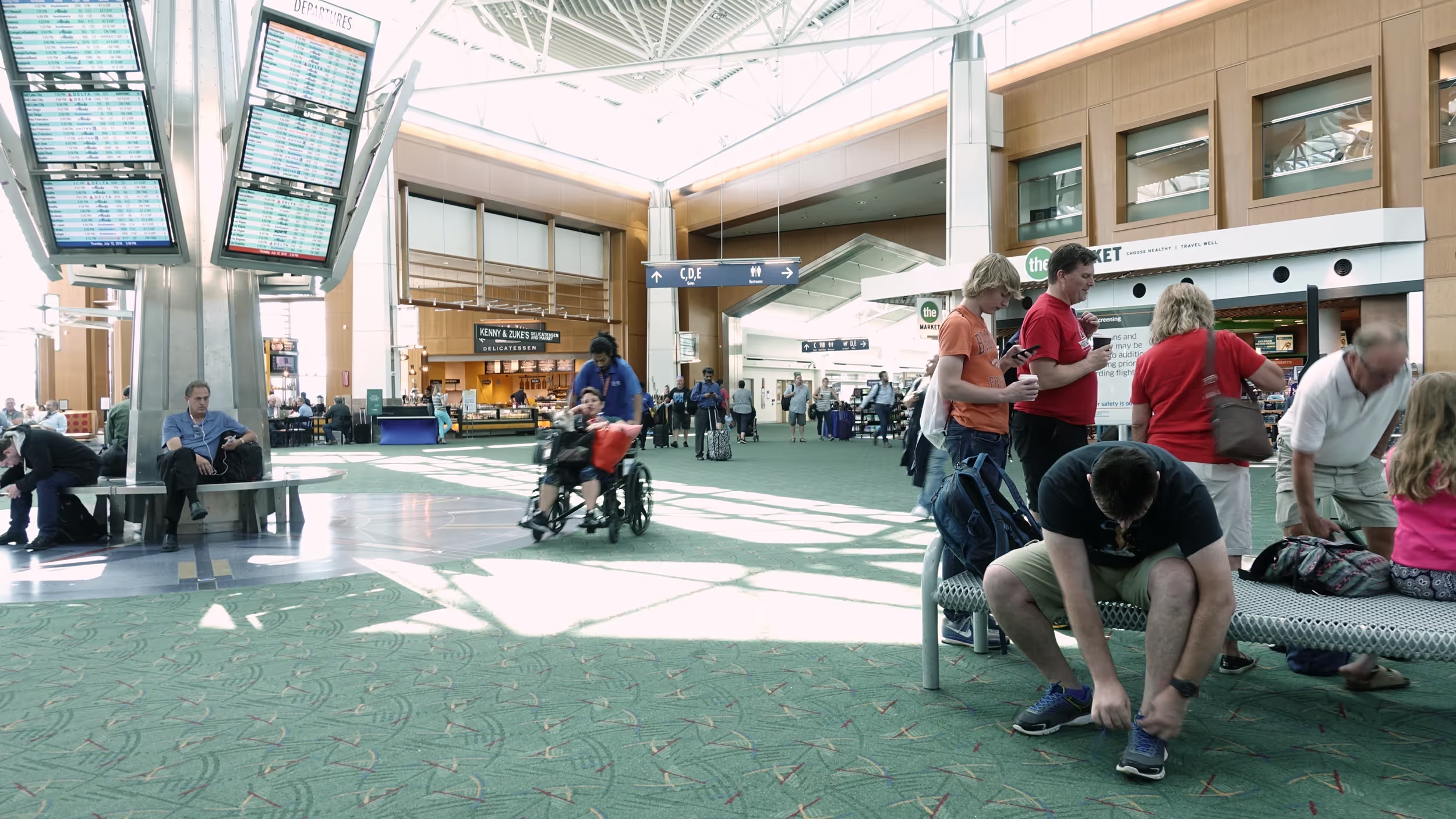Refunds vs. Travel Credits: Protecting Budgets When Projects Get Canceled

Your crew's stuck in Denver. A late-season blizzard just shut down the job site for three days, and now you need to get 12 workers home instead of extending their hotel stays. The airline offers travel credits worth 110% of the ticket value, but your finance team is asking pointed questions about cash flow and when those credits will actually get used.
When trips get canceled, the choice between demanding cash refunds or accepting travel credits can make the difference between protecting project budgets and watching money disappear into credit expirations.
The stakes have gotten higher. Federal regulations now require airlines to automatically issue cash refunds for canceled flights, but many companies still don't know when to demand refunds versus when credits make financial sense. Understanding this choice protects cash flow and prevents money from disappearing into expired credits.
What’s the Difference Between Refunds and Travel Credits?
When it comes to air travel, refunds and credits aren't just different payment methods: they're fundamentally different financial instruments with distinct legal protections and operational impacts.
The operational difference matters for project budgets: refunds improve immediate cash availability within days, while credits defer benefits by 60-180+ days until utilized. For construction projects operating on 60-90 day payment cycles, this timing difference directly impacts working capital and liquidity ratios.
Federal Guidelines Require Airlines to Refund Some Cancelled Flights
For airline travel, cash refunds represent a federally mandated return of money to your original payment method. Under DOT regulations, when airlines cancel flights or make significant schedule changes (3+ hours domestic, 6+ hours international), you have an absolute legal right to cash refunds processed within 7 business days for credit card payments or 20 days for other methods. Airlines cannot legally substitute credits for refunds without your explicit consent.
Air Travel Credits Are Non-Transferable and Often Expire
Travel credits are non-cash vouchers for future travel that airlines offer as alternatives (not replacements) for cash refunds. Credits typically expire within 12 months of issuance for voluntary cancellations, though involuntary cancellations now require a minimum 5-year validity under new federal rules established by the Department of Transportation's April 2024 Final Rule. Critical restrictions include non-transferability between travelers for voluntary cancellation credits (though involuntary cancellation credits must be transferable under federal mandate), booking channel limitations, and usage restrictions that often prevent combining multiple credits or applying them to ancillary fees.
Hotels and Car Rentals Have Their Own Refund Policies
Unlike airlines, hotels and car rental companies aren't subject to federal refund mandates, which means policies vary widely. Most major hotel chains offer full refunds within 24-48 hours of check-in, but properties near major events or in peak seasons often impose stricter non-refundable windows. Car rental companies typically provide full refunds with 24-hour notice for standard reservations, but specialty vehicles and peak periods may trigger prepayment requirements with partial or no refund options.
The key difference is local market control: individual hotel properties and car rental locations can override corporate policies based on demand, creating inconsistent refund experiences across the same brand. Project managers should verify refund terms directly with each property rather than assuming corporate-wide consistency.
Engine's FlexPro Eliminates the Refund vs. Credit Dilemma
For hotels booked through Engine, the FlexPro subscription changes the equation entirely. Cancel hotel stays up to noon on check-in day, modify reservations up to noon on checkout day, or cut trips short mid-stay—guaranteed, regardless of the hotel's cancellation policy.
When you cancel within the hotel's refund policy: You receive a refund to your original payment method.
When you cancel outside the hotel's policy: You receive an Engine travel credit to use on future bookings.
Your finance team gets predictable outcomes instead of vendor-dependent timing, and you're never stuck negotiating with individual properties or watching hotel credits expire. Engine processes these automatically based on the hotel's policy terms..
Note: Engine's Flex coverage for flights provides Engine travel credits for cancellations up to 2 hours before departure. For hotels, FlexPro determines whether you receive refunds or credits based on the hotel's cancellation policy timing.
Weigh the Financial Impact on Your Project Budgets
U.S. companies collectively spend approximately $17 billion annually covering travel disruption costs, which include significant cash flow strain from delayed credit utilization and rebooking premiums that average 27% above original booking prices. The choice between refunds and credits creates measurably different financial outcomes for distributed operations. Understanding these impacts helps finance teams make decisions that protect cash flow rather than accidentally creating budget problems.
Cash Flow Timing
Air travel refunds provide immediate liquidity improvement within 7-20 days per DOT regulations, while credits tie up capital in vendor-specific obligations that may take 60-180+ days to realize through expense reduction. For construction companies managing multiple projects simultaneously, this timing difference compounds.
Let's look at a typical project extension. You need additional crew lodging immediately, a $15,000 airline refund processes within 7 business days for credit card payments or 20 calendar days for other payment methods. Those same dollars locked in travel credits might not reduce expenses for months, creating working capital gaps on typical 60-90 day construction payment cycles.
Budget Reconciliation Challenges
Travel credits create cross-period timing issues that complicate project accounting. When credits from Q3 cancellations get applied to Q1 travel expenses, budget variance reports show artificial improvements in Q1 and artificial overages in Q3. This accounting noise makes it harder to accurately assess project profitability and identify real cost control issues.
Working Capital Impact
Credits function like forced vendor financing. You've essentially provided an interest-free loan to airlines or hotels, with restrictions on when and how you can recover that value. Companies facing liquidity constraints or covenant compliance concerns should prioritize refunds even when accepting penalties or forgoing credit value bonuses.
The Real Cost of Travel Credits vs. Refunds
A logistics company with 200 field service technicians experiences 84 canceled trips annually. Here’s how that plays out with an average $400 per flight.
What’s worse is that capital is unavailable for up to 18 months, and it costs you more in fees every month. With guaranteed refunds, you keep more capital in the bank.
Negotiate for the Best Outcome When Travel Gets Canceled
Successful refund negotiations require understanding when federal regulations provide automatic protection versus when you need to apply vendor relationship leverage.
For airline travel specifically, the April 2024 implementation of the DOT's Final Rule on Refunds and Consumer Protections has shifted the landscape significantly in favor of cash refunds.
Hotels and car rentals operate differently. They follow individual vendor policies rather than federal refund mandates, which means your negotiation strategy depends on the travel type.
Know Your Federal Rights
For airline cancellations: When airlines cancel flights or make significant schedule changes (3+ hours domestic, 6+ hours international), you have absolute refund rights under DOT regulations. Airlines must provide automatic cash refunds within 7 business days for credit card payments or 20 calendar days for other payment methods—no negotiation required.
For hotels and car rentals: No federal refund mandates exist. Your refund rights depend entirely on the cancellation policy you agreed to at booking and any negotiated contract terms with preferred vendors.
Document Excusable Delays
For airlines: When cancellations result from excusable delays, you're entitled to automatic cash refunds under DOT regulations regardless of the reason. The airline cancellation triggers your refund right.
For construction and field services, Federal Acquisition Regulation 52.249-14 defines "excusable delays" that strengthen your negotiation position across all travel types:
- Unusually severe weather forcing job site shutdowns
- Government actions (permit delays, quarantine restrictions)
- Acts of God (floods, earthquakes)
- Freight embargoes affecting equipment delivery
- Fires
- Epidemics
- Strikes
For hotels and car rentals: Excusable delay documentation strengthens your negotiation position but doesn't guarantee refunds. Success depends on your contract terms, vendor relationships, and the strength of your documentation. Properties may offer exceptions for documented force majeure events, but this requires negotiation rather than regulatory enforcement.
Use Volume Leverage
Consolidate travel spend to create negotiating leverage with hotels, airlines, and car rental companies. Companies that demonstrate complete volume visibility (including individual bookings, group stays, meetings, and events) can negotiate enhanced refund policies during the RFP phase. A construction company spending $500,000 annually on crew lodging has significantly more leverage with hotel chains than individual travelers making ad-hoc bookings.
Volume leverage matters more for hotels and car rentals than airlines, since airline refund rights are federally mandated for carrier-initiated cancellations. Use your negotiating power to secure flexible cancellation windows, reduced prepayment requirements, and force majeure protections in your hotel and car rental contracts.
Escalation Strategy
Start with designated corporate account managers, not general customer service. When account managers can't authorize refunds, escalate systematically: regional management, then national management, then executive relations.
Airlines: Focus escalation on processing speed and documentation rather than whether you're entitled to a refund. DOT regulations already establish that right for qualifying cancellations.
Hotels and car rentals: Frame escalation around your business relationship, future booking volume, and documentation of extenuating circumstances. Maintain professional, solution-oriented communication while documenting each attempt to preserve both immediate refund opportunities and long-term vendor relationships.
Force Majeure Timing (Primarily Hotels and Car Rentals)
Well-drafted force majeure clauses protect against non-refundable deposits and cancellation penalties with hotels and car rental companies when circumstances beyond your control force travel changes. For airlines, force majeure clauses are less relevant since DOT automatic refund rules already protect you when airlines cancel flights, regardless of the reason.
Force majeure protections must be negotiated pre-contract during RFP phases, not invoked after disruptions occur. According to the Federal Acquisition Regulation (FAR) 52.249-14, force majeure clauses should explicitly define covered events, including acts of God, public enemy actions, fires, floods, epidemics, quarantine restrictions, strikes, freight embargoes, and unusually severe weather.
Establish Clear Policies for Your Team
Effective refund and credit policies require three core components:
- Regulatory compliance, including DOT automatic refunds and IRS accountable plans
- Clear approval hierarchies with three authorization tiers
- Automated enforcement, including expiration alerts and tracking systems.
Companies without systematic policies watch money disappear through expired credits (with airlines recognizing material breakage revenue), and missed refund opportunities, particularly from airline-initiated cancellations where federal regulations mandate automatic cash refunds.
Default to Refunds for Protected Cancellations
Make cash refunds the default policy for airline-initiated cancellations or significant changes. DOT regulations guarantee these refunds, and employees should never feel pressured to accept credits when federal law provides cash alternatives. Reserve credits for voluntary changes where future travel to the same destination is highly probable.
Three-Tier Approval Structure
Implement approval hierarchies that scale with financial impact, modeled on industry best practices:
- Tier 1: Direct manager approval for standard travel requests and refund decisions within policy guidelines
- Tier 2: Senior leadership or finance approval for out-of-policy requests, travel exceptions, or refund/credit decisions exceeding standard thresholds
- Tier 3: Executive approval for international travel, extended trips, conference attendance, or strategic refund vs. credit decisions with significant financial implications
Documentation Requirements
Require itemized receipts submitted within 30 days of trip completion, along with business justification for credit versus refund decisions. Maintain audit trails for all expense decisions to support IRS accountable plan compliance and annual budget reconciliation.
For travel credits specifically, implement systematic tracking of expiration dates with alerts at 90, 60, and 30 days before expiration to prevent loss of value, and document the business rationale for accepting credits versus pursuing refunds, particularly for airline-initiated cancellations or significant schedule changes which qualify for mandatory automatic cash refunds.
Pre-Approval Framework
All travel should receive pre-approval before booking, with out-of-policy requests approved in advance. This prevents unauthorized spending and allows budget control before commitments are made. Pre-approval also enables better vendor negotiation by demonstrating controlled, predictable demand patterns.
Credit Usage Protocols
For accepted credits, require teams to use existing credits before purchasing new tickets. Your approval workflows should automatically check credit balances and flag any new bookings that bypass available credits.
Set up automated alerts at 90, 60, and 30 days before expiration so credits don't slip through the cracks. Assign a single point of contact to maintain centralized tracking across all departments, documenting expiration dates, transferability restrictions, and usage limitations. This prevents the "where did that credit go" problem that costs companies thousands in breakage annually.
Track and Management Travel Credits to Prevent Loss
Without systematic tracking, travel credits become worthless obligations. Industry data shows that even single airlines recognize millions in "breakage" revenue from unused credits, representing direct value loss for corporate travel programs. Finance managers tell us they've "lost track" of credits across multiple vendors and projects, discovering expired credits only during annual budget reviews.
Automated Enterprise Solutions
Leading enterprise platforms provide automated credit tracking with real-time expiration alerts. These systems integrate with booking workflows to automatically apply credits during new reservations and generate audit trails for compliance. For companies managing distributed teams across multiple projects, automated alerts at 90, 60, and 30 days prevent credits from expiring unnoticed.
Centralized Credit Management
Assign single points of contact for credit oversight rather than expecting individual travelers to track personal credit balances. A government agency case study demonstrated that centralized auditing and strategic choice to pursue cash refunds rather than future travel credits maximized financial returns while minimizing administrative burden on field staff.
Manual Tracking for Budget-Conscious Operations
Companies without enterprise software budgets can implement structured spreadsheet systems tracking service type, vendor, credit amount, expiration date, and department allocation. Set calendar reminders with 60-day grace periods before expiration and maintain daily reconciliation processes.
Systematic Unused Ticket Reviews
Work with travel management companies to conduct quarterly reviews of unused tickets, particularly for higher-value bookings. Airlines may offer refund opportunities for unused non-refundable tickets that aren't obvious during initial cancellation processing. A government agency case study demonstrates that pursuing full cash refunds rather than accepting future travel credits can maximize financial returns while minimizing administrative burden when managing high volumes of unused tickets across multiple vendors.
Critical Success Metrics
Track credit utilization rates as key performance indicators. Rates below 80% suggest credits are too restrictive or expiration periods are too short. Monitor credit losses through expiration as a percentage of total travel budget: losses above 2% indicate systematic tracking problems requiring process improvements.
Protect Your Budget When Project Plans Change
When your crew's trip gets canceled, you shouldn't have to choose between cash flow problems today and expired credits six months from now. Engine's FlexPro subscription eliminates that choice entirely.
Cancel hotel stays up to noon on check-in day and receive either immediate refunds (when canceling within the hotel's policy) or Engine travel credits (when canceling outside the hotel's policy)—guaranteed flexibility, regardless of how restrictive the hotel's original cancellation terms were.
Engine's platform also handles the operational details: automated credit tracking for airline Flex credits (which provide Engine travel credits for flight cancellations up to 2 hours before departure), expiration alerts at 90, 60, and 30 days, and credit-first booking enforcement to prevent losses. When airlines cancel flights, our 24/7 support team handles rebooking while ensuring you receive DOT-mandated cash refunds within 7-20 business days.
Ready to stop losing money to expired travel credits? See how Engine protects your travel budget when plans inevitably change.

Frequently Asked Questions
What's the difference between voluntary and involuntary travel credits?
Voluntary credits have more restrictions because you initiated the cancellation. So they typically expire within 12 months and offer limited transferability. Involuntary credits (airline-caused cancellations) must be valid for at least 5 years under federal regulations per the DOT's April 2024 rulemaking and offer more flexible terms, including transferability, which is federally mandated for involuntary cancellations regardless of carrier policies. Voluntary credits are often untransferrable.
Can I demand cash refunds instead of accepting travel credits?
Yes, when airlines cancel flights or make significant schedule changes (3+ hours domestic, 6+ hours international), federal law guarantees automatic cash refunds. Airlines cannot legally force credits on passengers when refunds are required.
How does Engine's FlexPro differ from airline travel credits?
Engine's FlexPro for hotels automatically processes either a refund to your original payment method (when canceling within the hotel's policy) or an Engine travel credit (when canceling outside the hotel's policy). You control the outcome based on your cash flow needs. Engine's Flex for flights provides Engine travel credits (not cash refunds) for cancellations up to 2 hours before departure. Unlike airline credits that expire in 12 months and lock to individual travelers, Engine travel credits apply to your company account and can be used by any authorized traveler for future bookings.
What documentation do I need for IRS compliance on travel refunds?
Maintain itemized receipts, business purpose documentation, and approval records for a minimum of three years per IRS requirements. For travel credits applied to future travel, document the original cancellation reason and subsequent usage with clear business justification for both transactions. Additionally, ensure compliance with accountable plan documentation requirements by substantiating the business purpose, date, location, and amount for each expense within 120 days of the trip.
Should construction companies prioritize refunds or credits for weather delays?
Weather delays qualify as excusable delays under federal contracting regulations, which strengthens your negotiation position. When airlines cancel flights due to weather, the DOT's April 2024 Refund Final Rule guarantees automatic cash refunds rather than credits.
For construction projects operating on 60-90 day payment cycles with unpredictable scheduling, refunds provide immediate cash flow flexibility. Pursue full refunds for airline-initiated cancellations to improve liquidity. Only accept credits if they offer extended validity (18+ months) and you have confirmed future travel to the same routes.
For hotels, Engine's FlexPro provides guaranteed flexibility—cancel up to noon on check-in day and receive either refunds (within policy) or Engine credits (outside policy), eliminating the need to negotiate with individual properties or lose money to restrictive cancellation windows.


.avif)



.avif)






















